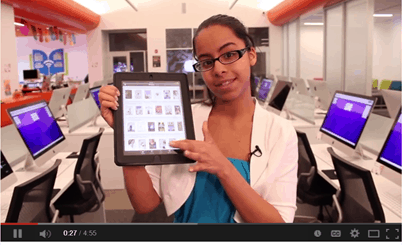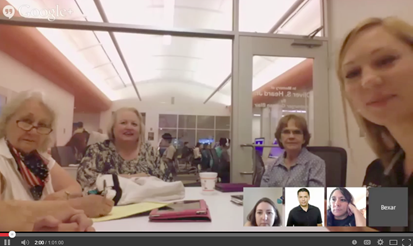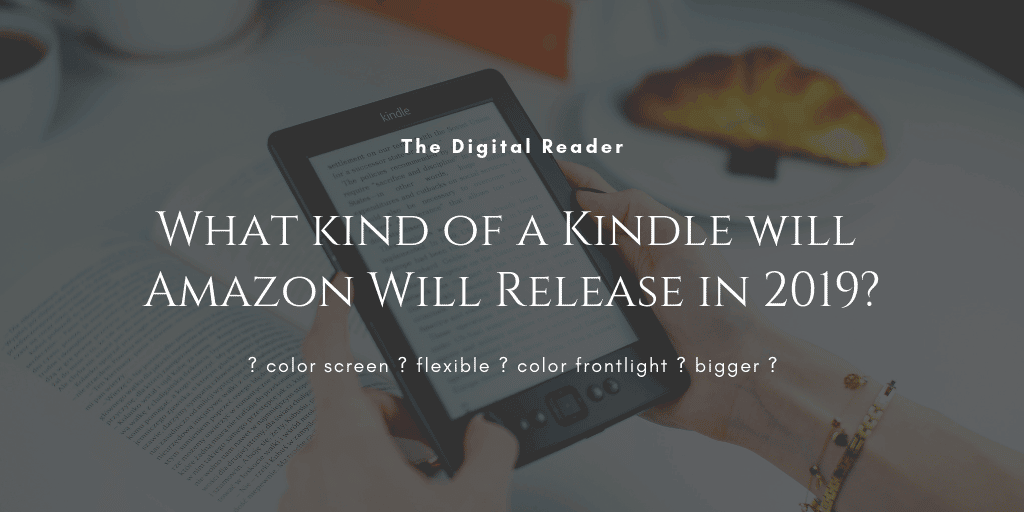Hip Video Explains All-Digital Library in Bexar County, Texas

![BiblioTechPromo2[1]](https://the-digital-reader.com/wp-content/uploads/2014/07/BiblioTechPromo21-250x151.png)
–Maybe even read E to your visiting child if you’re a jailed mother.
–Use two-way Google Hangouts video to enjoy a virtual book club without leaving your house. Or go to the same event in person and see yourself later on YouTube.
–Prepare for SATs and other school tests, or reserve a meeting room to work with friends on school projects.
–Learn a new language or sharpen your computer skills.
Those are some of the services that BiblioTech, the all-digital library in Bexar County, Texas, is offering. And you can watch in the video embedded below to understand better what BiblioTech is up to. Hear the music throb. The video, a gem from the Film School of San Antonio at Harlandale High School, is right on target for a young Hispanic audience. Perhaps other library systems can come up with variants using local film-making talent.
From afar, I see other good signs. More than eight months after BiblioTech opened, staffers are holding frequent in-library events, especially story times for kids, and are not just parking patrons in front of the computers. The library has doubled its e-book collection from the original 10,000—still a fraction of what national digital libraries could offer, but definite progress. Go here for LibraryCity’s earlier mentions of BiblioTech.
Jailed moms reading to their kids
Is the BliblioTech model right for all communities? No. But with an Apple Store-like interior, BiblioTech makes young people and minorities feel at home in an area underserved by regular libraries. BiblioTech even enables jailed mothers to read e-books to their kids when the children visit. “Stay connected through reading” isn’t in the above YouTube—the young woman holding up the iPad in the video is narrator Mariah Espinosa, not a prisoner!—but how could I not mention it in the headline? What a wonderful example of a library reaching out to the community.
What’s more, BiblioTech is getting in sync with the schools. In a pilot, 16 students at Carroll Bell Elementary School were loaned Nook e-readers. Both kids and parents received training. So, so clueful an approach. Students had to return the Nooks at the end of the school year, but reportedly “can check them out again from BiblioTech for the summer.”
BiblioTech even lets you read e-books in Braille.
As of February—I intend to get an update at some point—several hundred people a day were using BiblioTech on the average. Perhaps even localities with established library systems might consider experimenting with a Bexar-style approach in some library-short and dangerous neighborhoods, where parents don’t want their kids walking home after dark but may not be able chauffeur them. E-books could make a huge difference, whether from a BiblioTech-style library or a traditional one. The librarians could teach the kids about them during safe hours, and help them stock up with good reading at the library if they didn’t have WiFi at home.
Book clubs via Google Hangouts

My big hope is that Bexar and other libraries will pay more attention than now to the interests of male readers and play up plenty of nonfiction as well as novels. How about real-life adventure stories or biographies of Latino sports heroes, for example? I’m also curious about local high school coaches and other local athletic figures helping to talk up books and participating in book clubs.
If that happened, promo videos like Bexar’s could mention sports angles and others of interest of young people. This would be a great way to increase participation in the clubs. Nothing against good literature—just the reverse! But the big priority should be to boost engagement with the community at large, not merely the kinds of people most likely to be library regulars. Interest in literary novels can come eventually for many new patrons. Maybe it’s even time for a graphic novel book club. Besides, who says some popular-level books can’t also be good literature in their own ways?
reposted under a CC license from LibraryCity


Comments
Felipe Adan Lerma July 25, 2014 um 7:07 am
Yay Texas! and yay libraries!
Esp liked, "Use two-way Google Hangouts video to enjoy a virtual book club"
Great info, glad it has so many links to more also.
Re the small # of ebooks, OverDrive is working on an order-any-title-as-needed plan, so libraries can access what’s needed from the millions of titles available.
http://blogs.overdrive.com/front-page-library-news/2014/06/26/overdrive-to-present-20142015-ebook-lending-roadmap-at-national-library-conference/
Great re-post Nate, thanks!
David H. Rothman July 25, 2014 um 10:58 am
@Felipe Adan Lerma: Thanks for your kind words. Continued kudos to BiblioTech and Harlandale High School, where the young film-makers go (or went?)! And isn’t Mariah Espinosa (the super-talented narrator of the video) incredible? This isn’t the last we’ll hear from her.
I heartily approve of OverDrive’s new service as the company describes it. Thanks for mentioning it. At the same time, this isn’t the ultimate answer for libraries (particularly in poorer areas). I could be wrong, but I don’t think Bexar BiblioTech even has OverDrive. It uses the 3M Cloud service instead.
Longer term, we need a national digital library endowment and two well-stocked national digital library systems, one public, one academic—separate but tightly intertwined to stretch resources.
See http://philanthropy.com/article/The-Rich-Could-Tackle-Many/146911/
As the Chronicle piece shows, well-stocked and well-staffed libraries can help in areas ranging from K-12 to health. Very cost-effective public investments! I’m grateful to the Forbes.com clown for suggesting Kindle subscriptions in place of libraries. That got a lot of people thinking about their true worth, which, of course, extends far beyond the books themselves.
Thanks,
David
Felipe Adan Lerma July 25, 2014 um 11:43 am
Thank you David!
"I don’t think Bexar BiblioTech even has OverDrive. It uses the 3M Cloud service instead." – I didn’t even realize a library might not have access or have OverDrive. There is much I’m still learning.
A month ago, I was almost as bad as the give-them-a-kindle guy 🙂
And a national digital library sounds interesting too – as long as it doesn’t get digitally burned down ala Alexandria! If there were to be a national digital repository, maybe that should be part of its name, as a reminder of what fear and hate can do.
Nice link too, thank you 🙂
excerpt : "a not-so-modest proposal for the 400 richest Americans (together worth over $2-trillion, or more than the entire bottom half of our population)."
tubemonkey July 25, 2014 um 3:26 pm
BiblioTech is a great idea and I’d like to see more library systems adopt this program; especially the larger ones. With more resources, there’d be larger collections and the addition OverDrive. While I’m glad to see they’ve increased the size of their ebook collection, I’m quite dismayed to see that their audiobook collection has only 400 titles for OneClick and who knows how many for Hoopla.
One of the libraries I belong to uses 3M, but I can’t use it because 3M doesn’t support eink Kindle ereaders. I only read on eink devices, and so do many others. I’m locked out.
Kudos to Bexar County for adopting this. They’d go a long way to improve it by adding OverDrive and increasing the size of their collection.
Felipe Adan Lerma August 2, 2014 um 11:53 am
Posted a link to this at : , where the subject of libraries come up.